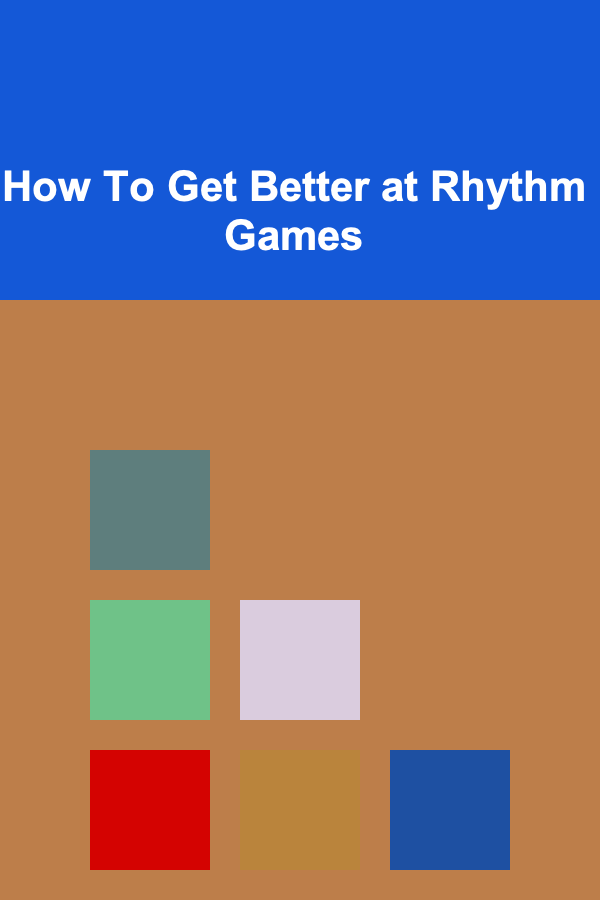
How To Get Better at Rhythm Games
ebook include PDF & Audio bundle (Micro Guide)
$12.99$7.99
Limited Time Offer! Order within the next:

Rhythm games are a popular genre that combines music and interactive gameplay, testing your ability to stay in sync with the beat. Whether it's tapping, pressing buttons, or dancing, rhythm games require precise timing, pattern recognition, and quick reflexes. For newcomers, it can be overwhelming, but with practice and understanding, you can improve significantly and even master difficult levels.
In this article, we will explore various strategies, techniques, and tips to help you get better at rhythm games. From understanding the fundamentals to developing advanced skills, we'll cover everything you need to know.
Understand the Game Mechanics
Learning the Basics
Before diving deep into advanced strategies, it's essential to understand the basic mechanics of rhythm games. These games typically consist of music tracks that require you to press specific buttons, keys, or touch on the screen in time with the rhythm. Different games have different control schemes, such as:
- Beatmania (DJ-style) -- Pressing colored buttons corresponding to music notes as they scroll down the screen.
- Osu! -- Clicking or tapping the screen in sync with the beat.
- Dance Dance Revolution (DDR) -- Stepping on arrows in sync with the music.
Learning how the controls work in the context of the rhythm is key. Spend time getting familiar with the game's interface, controls, and input methods. Practice in beginner levels until you get the hang of it before advancing to harder difficulties.
Timing and Accuracy
In rhythm games, timing is everything. Most games display a score based on how well you hit the notes or beats, and precision is vital to achieve high scores. Most rhythm games have different categories of accuracy, such as "perfect," "good," "bad," and "miss."
In rhythm games, you're not just hitting keys randomly. You're syncing your actions to the beat of the music. This synchronization is critical because rhythm games are all about timing and pattern recognition. As you progress, you'll need to develop a sharp sense of when to hit certain notes and learn how to anticipate complex patterns.
Visual Cues and Sound
In rhythm games, your brain is processing multiple forms of input at once, particularly visual cues and sounds. These are the two main types of feedback you rely on. Understanding how to interpret these cues effectively is one of the most important skills to develop.
- Visual cues: The screen will usually show you an incoming note or pattern. You'll need to predict when to press a button or perform an action based on the visual progression of the game.
- Sound cues: Music is the lifeblood of rhythm games. As you improve, you'll begin to better understand how the sound of the music correlates with the beat. This will help you identify patterns faster and hit notes more accurately.
Practice Regularly
Repetition is Key
Like any skill, practice is the cornerstone of improvement. When you start playing rhythm games, you may struggle with timing, accuracy, and memory, but consistent practice will allow you to gradually improve. Repetition allows your muscle memory to kick in, enabling you to hit beats without overthinking the process.
- Start slow: Begin by playing on easy or normal difficulty and work your way up. It's better to master the basics before attempting difficult songs.
- Focus on one aspect: If you find yourself struggling with timing or accuracy, focus on that specific aspect until you're comfortable with it.
Tracking Progress
Many rhythm games include progress-tracking features. They will show you your scores, accuracy, and improvements over time. Use this feedback to monitor your progress. For example, if you find that your accuracy rate is steadily improving but your speed is lagging, you can adjust your practice routine accordingly.
Increase Challenge Gradually
As you improve, you will need to increase the difficulty level to continue challenging yourself. This is important for preventing stagnation and ensuring continuous improvement.
- Start with easy songs, then move to medium and eventually hard levels as your confidence and skills grow.
- Playing different songs with varying tempos and patterns will improve your versatility and adaptability.
Focus on Developing Core Skills
Hand-Eye Coordination
Rhythm games require sharp hand-eye coordination, as your hands must quickly respond to what you see on the screen. Practicing regularly helps refine your motor skills, allowing you to respond quickly to visual cues.
To improve hand-eye coordination:
- Practice with both hands: In many rhythm games, using both hands can make the process easier. Try playing with both hands engaged to develop your coordination.
- Use your peripheral vision: Over time, you'll need to start using peripheral vision to anticipate upcoming notes. This allows you to react faster and more instinctively, without having to focus directly on every single note.
Reflex Speed and Reaction Time
Rhythm games test how quickly you can react to incoming notes. Some tracks involve rapid sequences that demand fast reflexes, while others may require more delicate timing. To improve your reaction time:
- Use reflex exercises: There are games and apps that specifically train your reaction speed. Use these to improve your overall reflex time.
- Work on your mental focus: Sometimes, slow reaction times can result from mental distractions. Train your mind to stay focused on the rhythm and to ignore outside distractions.
Memory and Pattern Recognition
As you progress in rhythm games, you'll be exposed to more complex patterns. These patterns are often repetitive, and your brain needs to learn how to recognize and predict them to stay in sync with the music. This is a crucial skill to develop, especially in games where multiple inputs need to be processed at once.
- Use pattern recognition drills: In many rhythm games, patterns are repetitive. Practice songs multiple times to memorize the most common patterns.
- Train visual memory: Memorizing visual cues and recognizing patterns in the game can give you a huge advantage.
Use External Tools to Help You Improve
Software and Practice Apps
There are a variety of rhythm game practice apps and programs designed to improve your skills. These apps provide additional drills and exercises that hone your timing, accuracy, and overall rhythm game performance.
For example, some games like Osu! offer customizable practice modes that allow you to slow down songs, repeat certain sections, and focus on specific challenges. These features help in breaking down songs and mastering difficult parts.
Play Along with Real Music
Some advanced rhythm gamers incorporate real-world music into their practice. If the rhythm game you're playing has a feature that allows you to play alongside tracks you love, use that opportunity to practice and apply what you've learned to more complex music. This makes practice feel more enjoyable and engaging while improving your musical ear.
Watching Others Play
Another great way to improve is to watch others who are better at the game. By observing how they approach difficult songs, you can pick up new strategies, tricks, and techniques. Many skilled rhythm game players upload videos or stream their gameplay, so take advantage of these resources.
Customize Your Setup
Adjust Sensitivity Settings
Different players prefer different input sensitivity. If you're playing on a console, arcade machine, or PC, ensure that the sensitivity of your controls is comfortable for you. Some games allow you to customize how much input is required to register a press. Tuning this to match your preferences can make a significant difference in your overall gameplay.
Comfortable Environment
Your gaming environment also plays a role in how well you perform. Whether you're playing at home or at an arcade, make sure you're comfortable:
- Sit in a position that lets you fully engage with the game.
- Use headphones to immerse yourself in the sound and minimize distractions.
- If possible, customize your controller or setup to better suit your play style (e.g., using a better pad for DDR).
Proper Posture and Ergonomics
Especially for games like Dance Dance Revolution or Just Dance, where you are moving your body, maintaining proper posture is important to avoid physical strain. You'll need to balance your body weight effectively and stay relaxed.
Develop Mental Toughness
Stay Calm Under Pressure
Some rhythm games can be intense, especially when you're nearing the end of a challenging level. It's easy to become stressed or anxious, but mental toughness is crucial for success. Practice remaining calm and focused, even when the music gets fast or the notes become complex.
Learn from Mistakes
It's important to accept that you'll make mistakes, and that's part of the learning process. Use each mistake as an opportunity to learn. Don't get frustrated---stay persistent, keep practicing, and use the experience to refine your skills.
Join the Rhythm Game Community
The rhythm game community is vast and filled with passionate players who can offer valuable tips, strategies, and advice. Joining forums, participating in online competitions, and sharing experiences with other players can accelerate your improvement.
- Online leaderboards: Competing against others in online leaderboards can give you a benchmark of where you stand in comparison to other players.
- Rhythm game tournaments: Participate in tournaments, both online and offline, to test your skills against the best.
Conclusion
Improving at rhythm games requires a combination of technical skill, mental fortitude, and consistent practice. By understanding the game mechanics, developing core skills, utilizing external tools, and engaging with the community, you can elevate your gameplay to new heights. Remember, becoming proficient at rhythm games takes time and patience. The more you practice and apply the strategies outlined in this article, the better you'll become. So, take a deep breath, sync up with the music, and start your journey toward becoming a rhythm game master.
Reading More From Our Other Websites
- [Scrapbooking Tip 101] DIY Quote Cards: Step-by-Step Projects for Adding Personalized Words to Any Scrapbook
- [Home Soundproofing 101] How to Achieve Effective Soundproofing with Soundproof Underlayment for Your Floors
- [Personal Care Tips 101] How to Use Hair Serum for Silky, Soft Hair
- [Paragliding Tip 101] Riding the Sky: Mastering Thermal Soaring Techniques for Paragliders
- [Tie-Dyeing Tip 101] How to Master the Batik‑Style Tie‑Dye Technique on Linen
- [Organization Tip 101] How to Create a Travel Inventory for Your Luggage
- [Beachcombing Tip 101] Unexpected Gems: Unusual Items You Might Uncover While Beachcombing
- [Personal Investment 101] How to Start Building a Business Investment Portfolio
- [Ziplining Tip 101] From Grounded to Gliding: Personal Stories of Overcoming Vertigo on the Zipline
- [Organization Tip 101] How to Create a DIY Bathroom Organizer with Household Items

10 Simple Tips for Saving Money on Household Cleaning Supplies
Read More
Earn Passive Income with Deep Learning: A Beginner's Guide
Read More
How to Budget for Home Maintenance and Avoid Costly Repairs
Read More
How to Create a Family Puzzle Challenge
Read More
How to Plan for Healthcare Costs in Your Retirement Years
Read More
How to Track Your Meal Planning Progress with a Checklist
Read MoreOther Products

10 Simple Tips for Saving Money on Household Cleaning Supplies
Read More
Earn Passive Income with Deep Learning: A Beginner's Guide
Read More
How to Budget for Home Maintenance and Avoid Costly Repairs
Read More
How to Create a Family Puzzle Challenge
Read More
How to Plan for Healthcare Costs in Your Retirement Years
Read More